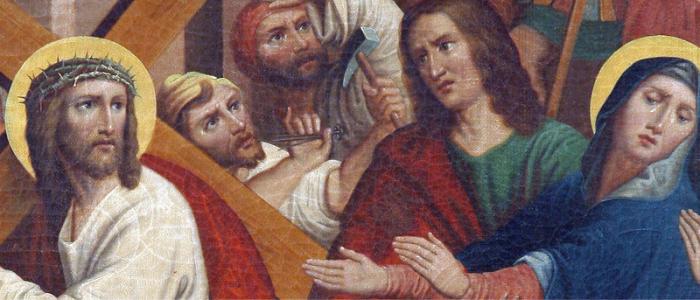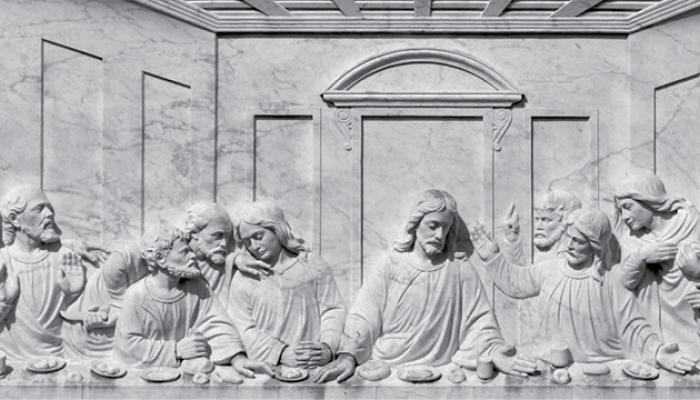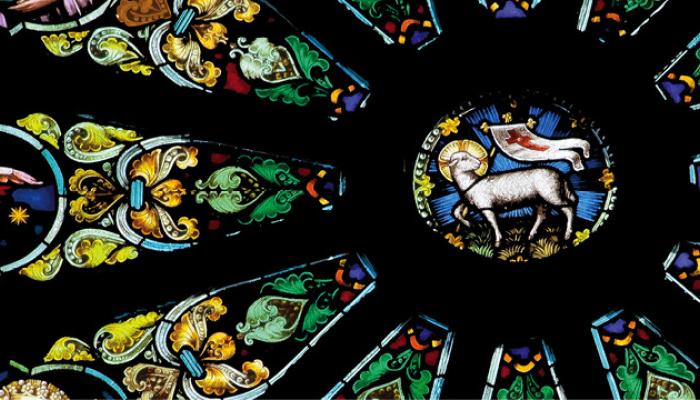
1.29 Jésus n’était-il qu'un homme bon et un sage gourou ?
Jésus est à la fois homme et Dieu. Le grand auteur C.S. Lewis disait : « Il vous faut choisir : ou bien cet homme était et est le Fils de Dieu, ou bien c’était un malade mental ou pire. »
Quelques personnes ont en effet traité Jésus de fou ou de possédé, mais d’autres ont reconnu en lui le Rédempteur que Dieu nous a promis à travers les âges. Car Jésus a fait voir les aveugles, marcher les estropiés, lever les morts et nous a délivrés de nos péchés par sa mort sur la croix. Ceci ne peut être que l’œuvre de Dieu et non de quelqu’un qui ne fut qu’homme.
How does the Church set forth the Mystery of the Incarnation?
The Church confesses that Jesus Christ is true God and true man, with two natures, a divine nature a
The Church confesses that Jesus Christ is true God and true man, with two natures, a divine nature and a human nature, not confused with each other but united in the Person of the Word. Therefore, in the humanity of Jesus all things - his miracles, his suffering, and his death - must be attributed to his divine Person which acts by means of his assumed human nature.
"O Only-begotten Son and Word of God you who are immortal, you who deigned for our salvation to become incarnate of the holy Mother of God and ever Virgin Mary (...) You who are one of the Holy Trinity, glorified with the Father and the Holy Spirit, save us!” (Byzantine Liturgy of Saint John Chrysostom) [CCCC 89]
Did the incarnate Son of God have a soul with human knowledge?
The Son of God assumed a body animated by a rational human soul. With his human intellect Jesus lear
The Son of God assumed a body animated by a rational human soul. With his human intellect Jesus learned many things by way of experience; but also as man the Son of God had an intimate and immediate knowledge of God his Father. He likewise understood people’s secret thoughts and he knew fully the eternal plans which he had come to reveal. [CCCC 90]
How did the two wills of the incarnate Word cooperate?
Jesus had a divine will and a human will. In his earthly life the Son of God humanly willed all that
Jesus had a divine will and a human will. In his earthly life the Son of God humanly willed all that he had divinely decided with the Father and the Holy Spirit for our salvation. The human will of Christ followed without opposition or reluctance the divine will or, in other words, it was subject to it. [CCCC 91]
What does it mean to say that Jesus Christ is at the same time true God and true man?
In Jesus, God really became one of us and thus our brother; nevertheless, he did not cease to be God
In Jesus, God really became one of us and thus our brother; nevertheless, he did not cease to be God at the same time and thus our Lord. The Council of Chalcedon in the year 451 taught that the divinity and the humanity in the one person Jesus Christ are united together “without division or confusion”.
The Church grappled for a long time with the problem of how to express the relation between the divinity and humanity in Jesus Christ. Divinity and humanity are not in competition with each other, which would make Jesus only partially God and only partially man. Nor is it true that the divine and human in Jesus are confused. God took on a human body in Jesus; this was no mere appearance (Docetism), but he really became man. Nor are there two different persons in Christ, one human and one divine (Nestorianism). Nor is it true, finally, that in Jesus Christ the human nature was absorbed into the divine nature (Monophysitism). Contrary to all these heresies, the Church has adhered to the belief that Jesus Christ is at the same time true God and true man in one Person. The famous formula, “without division or confusion” (Council of Chalcedon) does not attempt to explain something that is too sublime for human understanding, but rather draws the boundaries, so to speak, of the faith. It indicates the “line” along which the mystery of the person of Jesus Christ can be investigated. [Youcat 77]
[Christ] did these [miracles], yet was he despised by the many, who considered not so much what grea
[Christ] did these [miracles], yet was he despised by the many, who considered not so much what great things he did, as how small he was; as though they said within themselves, these are divine things, but he is a man. Two things than you see, divine works and a man. If divine works cannot be wrought but by God, take heed lest in This Man God lie concealed. [St. Augustine, Sermons, No. 126 (ML 38, 700)]





